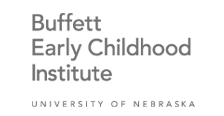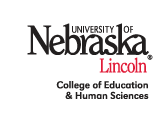
Research Presentations
Session I
Early Language & Literacy: Supporting Teachers’ Data‐based Decision-making
The Pre‐3T project focused on developing and piloting a three‐tiered prevention model (i.e., Response-to-Intervention) in early education
for children at risk of reading difficulties. This presentation will describe the development of the teacher-implemented decision-
making protocol used to identify children in need of differentiated literacy support and evaluate their response to intervention
strategies. In addition to explicating the measures, tools and processes used in the study, the presentation will outline preliminary
results demonstrating the feasibility and effectiveness of the decision-making protocol.
Brandy Clarke, PhD
Research Assistant ProfessorNebraska Center for Research on Children, Youth, Families & Schools
Lisa Knoche, PhD
Research Associate ProfessorNebraska Center for Research on Children, Youth, Families & Schools
Susan Sheridan, PhD
DirectorNebraska Center for Research on Children, Youth, Families & Schools
A Model of Effective Coaching Support
for Early Reading RTI
This presentation will discuss outcomes from a large-scale randomized trial that evaluated the impact of a professional development
approach for training rural K‐3 teachers to implement Response-to-Intervention (RTI) in the area of early reading. Attendees will learn
how professional development that supports teachers’ use of data‐based decision-making and research‐based interventions can be
used to effectively promote student performance in schools.
Michelle Howell Smith, PhD
Project ManagerNebraska Center for Research on Children, Youth, Families & Schools
Tanya Ihlo, PhD
Research Assistant ProfessorNebraska Center for Research on Children, Youth, Families & Schools
Role Identity & Professional Development of
Home‐based Early Childhood Caregivers
This presentation will offer insight into tailoring professional development for family childcare providers, specifically examining a
mixed-methods study of how role identity influenced their participation in professional development. Survey analyses demonstrated
that a stronger sense of identity as an early care and education professional predicted greater involvement in professional development.
Through qualitative interviews, providers described the importance of balancing blended roles as family caregivers and professionals;
they also outlined how professional development strengthened their knowledge and identities as early care providers.
Rebecca Swartz, PhD
Assistant ProfessorEarly Childhood Education Extension Specialist
Department of Child, Youth & Family Studies
zUniversity of Nebraska-Lincoln
Getting Ready: Strategies to Support
Parent Engagement During Home Visits
This presentation explores school readiness intervention strategies used by early childhood professionals to support parent engagement
in young children’s learning. Thirty‐two early childhood professionals were videorecorded during Early Head Start and Head Start
home visits. Study findings help to unpack the black box of home visiting and investigate what professionals are doing to enhance
parent engagement. The findings also help explain how families respond and who is interacting during these home visits.
Christine Marvin, PhD
Associate ProfessorDepartment of Special Education & Communication Disorders
University of Nebraska-Lincoln
Lisa Knoche, PhD
Research Associate ProfessorNebraska Center for Research on Children, Youth, Families & Schools
Preschool Children’s Environmental
Moral Reasoning
The presenter’s research uses Social Domain Theory to examine preschool children’s moral reasoning with respect to the environment.
As part of this research, 126 preschool‐aged children were interviewed; 53 attended a nature-focused preschool, while 73 attended
non‐nature‐focused preschools. This presentation will examine the study’s results, including the finding that a majority of children in
both types of programs judged throwing trash in a lake as wrong regardless of context, rules or social convention – indicating that it is
a matter of obligatory morality.
Julia Torquati, PhD
Associate ProfessorDepartment of Child, Youth & Family Studies
University of Nebraska-Lincoln
Evaluating Mobile Applications: Educational
Mobile Application Teacher Rating Scale (E.MATRS)
Educators and researchers have recently become interested in using technology to enhance teaching effectiveness and children’s
learning in developmentally appropriate ways. Determining whether a mobile application meets the needs of the young children,
supports teacher instruction, and engages children in appropriate content is necessary prior to incorporating it into instruction. This
session will discuss the development and results of a mobile application analysis tool for the teaching and learning of science among
young children.
Krista Adams, PhD
Assistant ProfessorDepartment of Teaching, Learning & Teacher Education
University of Nebraska-Lincoln
Douglas Golick, PhD
Assistant ProfessorDepartment of Entomology
University of Nebraska-Lincoln
Soo-Young Hong, PhD
Assistant ProfessorDepartment of Child, Youth & Family Studies
University of Nebraska-Lincoln
Presentation not available for download.
Extension’s Capacity to Deliver Quality
Early Childhood Professional Development
This presentation will share findings from an environmental scan of the early childhood professional development programs offered
within the Cooperative Extension System. A study was conducted to identify the programs’ content, delivery, scope, evaluation and
partners. Results indicate that Extension has become a player in providing professional development opportunities for early childhood
professionals and, with a focused effort on streamlining current resources, has the capacity to become a leader in this field.
Tonia Durden, PhD
Assistant ProfessorEarly Childhood Education Extension Specialist
Department of Child, Youth & Family Studies
University of Nebraska-Lincoln
Preschool Science: Collaborative Approach
to Teaching & Learning
This presentation outlines a study designed to (a) create learning communities between university researchers and preschool teachers
that explore ways to promote teachers’ understanding of science concepts and practice; (b) help preschool teachers formulate
developmentally appropriate science activities for preschool children; and (c) examine how teachers’ attitudes about teaching science
– along with their behaviors in preschool classrooms – change over the course of the collaborative process.
Soo-Young Hong, PhD
Assistant ProfessorDepartment of Child, Youth & Family Studies
University of Nebraska-Lincoln
Shaista Syeda
Graduate StudentDepartment of Child, Youth & Family Studies
University of Nebraska-Lincoln
Jungwon Eum
Graduate StudentDepartment of Child, Youth & Family Studies
University of Nebraska-Lincoln
Session II
Difficult Temperament, Difficult Sleeper?
Examination of Toddler Behavior & Sleep
Sleep habits of young children are related to the development of the cognitive and self‐regulation skills that influence school readiness.
While there is a growing awareness of the importance of sleep, there is also evidence that parents’ perceptions of children’s sleep habits
is sometimes different from actual measures of sleep. This presentation focuses on how parents perceive their child’s sleep habits,
whether those perceptions are influenced by children’s temperament, and how these factors collectively influence school readiness.
Kathleen Rudasill, PhD
Associate ProfessorDepartment of Educational Psychology
University of Nebraska-Lincoln
Victoria Molfese, PhD
Chancellor’s ProfessorDepartment of Child, Youth & Family Studies
University of Nebraska-Lincoln
Amanda Prokasky
Project CoordinatorDepartment of Child, Youth & Family Studies
University of Nebraska-Lincoln
Elaina Montague
Graduate StudentDepartment of Psychology
University of Nebraska-Lincoln
Prompting Change from the Start:
Year One Classroom Assessments &
Feedback with a New Program
Classroom assessments (Classroom Assessment Scoring System [CLASS] and Rating Scales [RS]) were conducted during fall 2013 in 13
new Lincoln Educare classrooms. Results on the RS ranged from 5.4 to 6.8 overall, though sub-scales showed variance. Results of the
Toddler CLASS ranged from 5.4 to 6.7 on Emotional and Behavioral Supports and from 2.9 to 4.6 on Engaged Support for Learning.
Scores, feedback procedures and case studies related to improvement will be shared.
Julia Dadds, PhD
Executive DirectorEducare of Lincoln
Jan Esteraich
Graduate StudentDepartment of Child, Youth & Family Studies
University of Nebraska-Lincoln
Amy Colgrove
Graduate StudentDepartment of Child, Youth & Family Studies
University of Nebraska-Lincoln
Helen Raikes, PhD
Willa Cather ProfessorDepartment of Child, Youth & Family Studies
University of Nebraska-Lincoln
Rebecca Swartz, PhD
Assistant ProfessorEarly Childhood Education Extension Specialist
Department of Child, Youth & Family Studies
University of Nebraska-Lincoln
Michelle Rupiper, PhD
Associate Professor of PracticeDepartment of Child, Youth & Family Studies
University of Nebraska-Lincoln
Longitudinal Changes in K-3 Teachers’
Mathematical Content & Pedagogical Knowledge
This presentation examines longitudinal trajectories of change in the knowledge, attitudes and beliefs of 90 K-3 teachers in Primarily
Math – a professional development program designed to augment mathematical content and pedagogical knowledge – relative to a
matched comparison group over five measurement occasions. Primarily Math teachers demonstrated greater geometric knowledge
for teaching; reported more confidence, improved motivation and less anxiety for learning mathematics; and exhibited more student-
centered beliefs alongside fewer teacher‐centered beliefs.
Traci Shizu Kutaka, PhD
Postdoctoral Research AssociateCenter for Science, Mathematics & Computer Education
University of Nebraska-Lincoln
Carolyn Pope Edwards, EdD
Willa Cather ProfessorDepartment of Child, Youth & Family Studies
University of Nebraska-Lincoln
Kindergarten Children’s Development &
Relationships in Rural & Non-rural Settings
Research has consistently documented the importance of the early years in establishing positive trajectories for behavioral competence
and important relationships. This presentation addresses an important research question concerning the role of community
setting (i.e., rural vs. non-rural) on kindergarten children’s social‐behavioral skills and the cross-systemic supportive relationships in
young children’s lives. Given the unique demographic features of many rural communities – particularly those plagued by poverty, low
education and related risk factors – it also strives to understand how geographic setting interacts with cumulative risk in predicting
child and parent‐teacher outcomes.
Susan Sheridan, PhD
DirectorNebraska Center for Research on Children, Youth, Families & Schools
Michael Coutts
Graduate Research AssistantDepartment of Educational Psychology
University of Nebraska-Lincoln
Shannon Holmes
Graduate Research AssistantDepartment of Educational Psychology
University of Nebraska-Lincoln
Amanda Witte
Project ManagerNebraska Center for Research on Children, Youth, Families & Schools
Sonya Bhatia
Graduate Research AssistantDepartment of Educational Psychology
University of Nebraska-Lincoln
Session III
Economic Impact of Early Childhood Education
& Programming in Nebraska
This presentation will quantify a variety of benefits and costs associated with providing high-quality early childhood education to children
at risk in Nebraska, with state‐specific data used to make projections when possible. The presentation will report the results of
measures that include the benefit-cost ratio of providing early childhood education, the internal rate of return, and the payback period.
Lisa Knoche, PhD
Research Associate ProfessorNebraska Center for Research on Children, Youth, Families & Schools
David Rosenbaum, PhD
ProfessorAssociate Director for Academic Affairs
Jeffrey S. Raikes School of Computer Science & Management
University of Nebraska-Lincoln
Eric Thompson, PhD
DirectorAssociate Professor
Bureau of Business Research
Department of Economics
University of Nebraska-Lincoln
Rural Family-School Partnerships:
Bridging Research & Practice
This presentation will share the evidence base supporting family‐school partnerships to promote positive academic, behavioral and social-
emotional outcomes for young children. Specifically, the presenters will outline preliminary findings from a current study examining
the efficacy of Conjoint Behavioral Consultation (CBC) on rural K‐3 students, their families and teachers. To illustrate the connection
between research and practice, the presenters will offer case examples of unique applications of CBC in the rural context.
Gina Kunz, PhD
Research Associate ProfessorNebraska Center for Research on Children, Youth, Families & Schools
Susan Sheridan, PhD
DirectorNebraska Center for Research on Children, Youth, Families & Schools
Typically Developing Preschoolers’ Behavior
toward Peers with Disabilities
This presentation outlines a study that examined contexts in which typically developing preschoolers (TD) were likely to interact with
their peers with disabilities (D), as well as the nature of those social interactions. An eco-behavioral analysis with observational data
from 22 preschoolers and seven teachers revealed that TD tended to interact with D more in an outdoor than indoor classroom. TD also
interacted with D more during play‐based activities than during academic activities or transitions/routines. The presentation will examine
the implications of these findings, along with the revelation that teachers provided minimal support for these social interactions.
Soo-Young Hong, PhD
Assistant ProfessorDepartment of Child, Youth & Family Studies
University of Nebraska-Lincoln
Jungwon Eum
Graduate StudentDepartment of Child, Youth & Family Studies
University of Nebraska-Lincoln
Factors Affecting Kindergarten Readiness in
Great Plains Rural ESSS Communities
This presentation focuses on baseline school readiness in 10 Great Plains rural communities participating in Save the Children’s Early
Steps to School Success (ESSS) literacy-based home-visiting program for children ages 0-3, along with the pre-K/bookbag program for
children ages 3-5. It will address kindergarten-entry findings from the Peabody Picture Vocabulary Test-4, which show that eligibility
for free and reduced lunch, along with limited English proficiency, are negatively associated with test scores. The presentation will also
discuss the finding that exposure to a year of preschool or Head Start positively correlates with test scores.
Helen Raikes, PhD
Willa Cather ProfessorDepartment of Child, Youth & Family Studies
University of Nebraska-Lincoln
Jan Esteraich
Graduate StudentDepartment of Child, Youth & Family Studies
University of Nebraska-Lincoln
Elsa Escalante
Graduate StudentDepartment of Child, Youth & Family Studies
University of Nebraska-Lincoln



